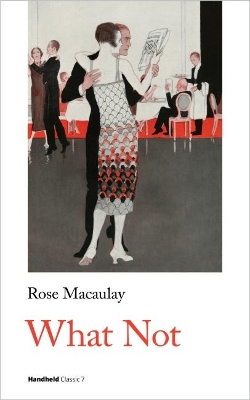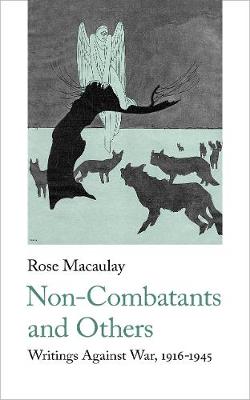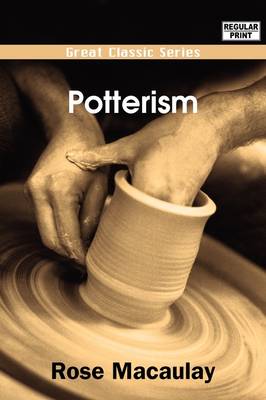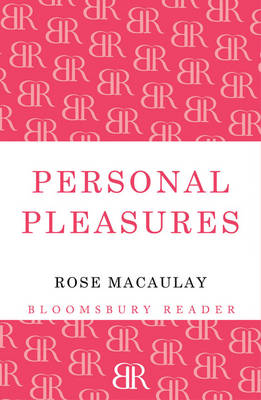Handheld Classics
5 primary works
Book 7
What Not is Rose Macaulay’s speculative novel of post-First World War eugenics and newspaper manipulation that anticipated Aldous Huxley’s Brave New World by 14 years.
Published in 1918, it was hastily withdrawn due to a number of potentially libellous pages, and was reissued in 1919. But by then it was quickly overshadowed by Macaulay’s next two novels, and never gained the attention it deserved. What Not is a lost classic of feminist wit and protest at social engineering, now republished with the suppressed pages reinstated.
Kitty Grammont and Nicholas Chester are in love, but Kitty is certified as an A for breeding purposes, while politically ambitious Chester has been uncertificated, and may not marry. But why? There’s nothing apparently wrong with him, he is admired in his field, and is charming and decisive. Although Kitty wields power as a senior civil servant in the Ministry of Brains, which makes these classifications, she does not have the freedom to marry who she wants. They ignore the restrictions, and carry on a discreet affair. But it isn’t discreet enough for the media: the popular press, determined to smash the brutal regime of the Ministry of Brains, has found out about Kitty and Chester, and scents an opportunity for a scandalous exposure.
The introduction is by Sarah Lonsdale, senior lecturer in journalism at City University London.
Published in 1918, it was hastily withdrawn due to a number of potentially libellous pages, and was reissued in 1919. But by then it was quickly overshadowed by Macaulay’s next two novels, and never gained the attention it deserved. What Not is a lost classic of feminist wit and protest at social engineering, now republished with the suppressed pages reinstated.
Kitty Grammont and Nicholas Chester are in love, but Kitty is certified as an A for breeding purposes, while politically ambitious Chester has been uncertificated, and may not marry. But why? There’s nothing apparently wrong with him, he is admired in his field, and is charming and decisive. Although Kitty wields power as a senior civil servant in the Ministry of Brains, which makes these classifications, she does not have the freedom to marry who she wants. They ignore the restrictions, and carry on a discreet affair. But it isn’t discreet enough for the media: the popular press, determined to smash the brutal regime of the Ministry of Brains, has found out about Kitty and Chester, and scents an opportunity for a scandalous exposure.
The introduction is by Sarah Lonsdale, senior lecturer in journalism at City University London.
Book 7
Book 15
All Rose Macaulay's anti-war writing, collected together in one fascinating and thought-provoking volume.
Her novel Non-Combatants and Others (1916) is a classic of pacifist writing, and was one of the first novels to be written and published during the First World War that set out the moral and ideological arguments against war. It's scathing and heart-breaking, yet finds a way for pacifists to work for an end to conflict.
Her journalism for The Spectator, Time & Tide, The Listener and other magazines from the mid-1930s to the end of the Second World War, details the rise of fascism and the civilian response to the impending war. Witty, furious and despairing in turn, these forgotten magazine columns reveal new insights into how people find war and its tyrannies creeping up on them. These are supported by Macaulay's two inter-war essays on pacifism,`Apeing the Barbarians' and `Moral Indignation'.
Macaulay's only wartime short story, `Miss Anstruther's Letters', is a devastating account of the loss of her flat and all her possessions in the Blitz. But more desperate a loss than her books were the letters from her secret lover, who had just died.
The Introduction is by Jessica Gildersleeve of the University of Southern Queensland.
The cover illustration, `Peace Angel', is by the Norwegian caricaturist Olaf Gulbransson, published in the German satirical magazine Simplicissimus in 1917.
Her novel Non-Combatants and Others (1916) is a classic of pacifist writing, and was one of the first novels to be written and published during the First World War that set out the moral and ideological arguments against war. It's scathing and heart-breaking, yet finds a way for pacifists to work for an end to conflict.
Her journalism for The Spectator, Time & Tide, The Listener and other magazines from the mid-1930s to the end of the Second World War, details the rise of fascism and the civilian response to the impending war. Witty, furious and despairing in turn, these forgotten magazine columns reveal new insights into how people find war and its tyrannies creeping up on them. These are supported by Macaulay's two inter-war essays on pacifism,`Apeing the Barbarians' and `Moral Indignation'.
Macaulay's only wartime short story, `Miss Anstruther's Letters', is a devastating account of the loss of her flat and all her possessions in the Blitz. But more desperate a loss than her books were the letters from her secret lover, who had just died.
The Introduction is by Jessica Gildersleeve of the University of Southern Queensland.
The cover illustration, `Peace Angel', is by the Norwegian caricaturist Olaf Gulbransson, published in the German satirical magazine Simplicissimus in 1917.
Book 16
Rose Macaulay's 1920 satire on British journalism and the newspaper industry will be back in print in the UK for the first time in seventy years. It will be published alongside a new collection of her pacifist writing from 1916 to 1945, Non-Combatants and Others: Writings Against War (ISBN 9781912766307).
Potterism is about the Potter newspaper empire, and the ways in which journalists struggled to balance the truth and what would sell, during the First World War and into the 1920s. When Jane and Johnny Potter are at Oxford they learn to despise their father's popular newspapers, though they still end up working for the family business. But Jane is greedy, and wants more than society will let her have.
Mrs Potter is a well-known romantic novelist, whose cheap novelettes appear in the shop-girls' magazines. She has become unable to distinguish fact from fiction, and her success gives her an unhealthy estimation of her own influence. When she visits a medium to try to find the truth about the murder of her son-in-law, she wreaks terrible damage.
Arthur Gideon works for Mr Potter as an editor. He respects his employer's honesty while he despises the populist newspapers he has to produce. His turbulent campaigning spirit, and his furious resistance to anti-Semitic attacks, make him unpopular, and becomes an unwitting target of malice.
Potterism is about the Potter newspaper empire, and the ways in which journalists struggled to balance the truth and what would sell, during the First World War and into the 1920s. When Jane and Johnny Potter are at Oxford they learn to despise their father's popular newspapers, though they still end up working for the family business. But Jane is greedy, and wants more than society will let her have.
Mrs Potter is a well-known romantic novelist, whose cheap novelettes appear in the shop-girls' magazines. She has become unable to distinguish fact from fiction, and her success gives her an unhealthy estimation of her own influence. When she visits a medium to try to find the truth about the murder of her son-in-law, she wreaks terrible damage.
Arthur Gideon works for Mr Potter as an editor. He respects his employer's honesty while he despises the populist newspapers he has to produce. His turbulent campaigning spirit, and his furious resistance to anti-Semitic attacks, make him unpopular, and becomes an unwitting target of malice.
Book 21
In 1935 Rose Macaulay (1881-1958) was a well-established novelist, reviewer, columnist and feminist wit. She was part of the 'intellectual aristocracy' of England, but was also passionately interested in everyday life and its foolishnesses. Personal Pleasures is an anthology of 80 short essays (some of them very short) about the things she enjoyed most in life. Her subjects include:
Bed (Getting Into It)
Booksellers Catalogues
Christmas Morning
Driving a Car
Flattery
Heresies
Not Going to Parties
Shopping Abroad
Writing
While each essay can be read on its own as a short dose of delicious writing, the collection is also an autobiographical selection, revealing glimpses of Rose's own life, and making us laugh helplessly with her inimitable humour.
Bed (Getting Into It)
Booksellers Catalogues
Christmas Morning
Driving a Car
Flattery
Heresies
Not Going to Parties
Shopping Abroad
Writing
While each essay can be read on its own as a short dose of delicious writing, the collection is also an autobiographical selection, revealing glimpses of Rose's own life, and making us laugh helplessly with her inimitable humour.




